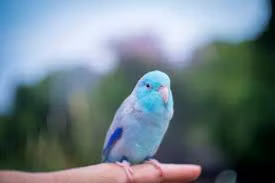Why Birds Make Wonderful Companions

Author: Vejay Anand
Birds can be the perfect companions for individuals with limited space, mobility, or financial resources. Whether you're a senior citizen, an only child, or someone living in a petless household, birds offer companionship and joy for many years. Here are several compelling reasons why birds make great companions for the right home:
Problem Solvers with Intelligence:
Birds are known for their problem-solving abilities and impressive cognitive skills. They can use tools and exhibit behaviors that suggest a high degree of intelligence. Some birds even possess remarkable mimicking skills. While birds like crows may not be suitable pets, their reasoning abilities have been likened to those of a 7-year-old human.
Social Creatures:
Birds are naturally inclined to flock, meaning they thrive on companionship. A solitary bird can become quite lonely, just like humans do. Many birds will sing, talk, and play with their owners, especially when given time to interact outside their cages. Birds are relatively easy to care for as they can be secured in their cells when owners are occupied. This convenience makes bird ownership an attractive option for many individuals, particularly those with busy lifestyles.
Hygienic and Low-maintenance:
Birds are naturally hygienic animals that groom themselves regularly to keep their feathers clean and shiny. Bird owners must not handle shampoos, flea baths, or costly haircuts. A quick nail trim and occasional feather clipping are usually sufficient to maintain a bird's appearance. Cleaning involves light showers or spritzing with clean, non-chlorinated water, making bird care straightforward and manageable for individuals with physical limitations.
Loving and Affectionate:
With proper training and socialization, birds can be as affectionate as cats or dogs. Some pet birds become inseparable from their owners, accompanying them on daily outings. Birds can also be trained to perform tasks and tricks due to their exceptional mimicry abilities. They recognize their owners, their cage, and their toys. The more time spent with your bird outside the cell, the more engaging your interactions will become.
Cost-Effective Feeding:
Compared to other pets, birds have modest dietary requirements. Even the most giant birds consume minimal amounts of food, primarily plant-based items, less expensive than protein-packed products for cats and dogs. Providing high-quality pelleted food, seed foods, and fresh produce while sharing your meals with your bird ensures they receive a balanced diet.
Sharing small portions of fresh fruits and vegetables with your bird during mealtimes can enhance their nutrition and meal variety. Make sure the foods you share are safe and non-toxic for birds.
Space-Friendly Pets:
Small bird species are excellent choices for individuals living in apartments or condominiums with limited space. Their compact cages easily fit into cozier living environments, making them suitable for confined spaces.
However, it's essential to consider potential noise levels, as close quarters might affect neighbors. Some birds can be vocal, so be mindful of how your bird's sounds may impact nearby residents.
Longevity:
Many bird species have long lifespans, with some living for over 100 years. This long-term commitment often reassures people who want a pet to cherish and enjoy for many years, even after losing a beloved pet.
By understanding these reasons, you can appreciate why birds make lovely companions for those with the right living conditions and preferences.

